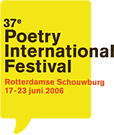Poet
|
Eldrid Lunden 1940-... country: Norway language: Norwegian |
The Norwegian poet Eldrid Lunden (1940) made her debut in 1968 and has since published nine volumes of poetry and a collection of essays. Her latest collection Til stades (‘On the spot’) appeared in 2000; it is a kind of travel journal in which poems alternate with lyrical prose pieces. A striking phenomenon in the reception her work gets from critics and fellow poets is a tendency on their part to link Lunden’s collections to the decades in which they were written, and to declare a preference for widely differing decades. It illustrates the many different characters of Lunden’s poetry, ranging from political and social comment, through surprisingly matter-of-fact reflections on the relation between language and identity, language and body, to giving words to intimacy and pain. The selection which Eldrid Lunden has made from her collection Gjenkjennelsen (‘Recognition’) to read at Poetry International 2002, contains examples of the above themes, which pervade all her collections. Her line ‘I have a spot on my tongue / there sits a word’ seems to sum up her writer’s creed in eleven words. Lunden’s searching lyricism, at once restrained and outspoken, places her among Norway’s most outstanding poets today. For her poetic oeuvre she was awarded Norway’s prestigious Brage prize in 2001. This prize also recognized her significance for Scandinavia’s first Academy of the Art of Writing, founded in Bø in Telemark in 1982, and connected with her name from the very start. Since 1996 she has been the Academy’s professor of the Art of Writing, a title which - as she herself observed with some self-irony in an interview in that year - no one else could boast. Author: Janke Klok Translated by Ko Kooman Eldrid Lunden (Norway, 1940) ranks among the most prominent poets of her generation. She was an instigator of a major formal change in post-war Norwegian poetry, described as ‘New Simplicity’. Her latest collection, Til stades, is subtitled ‘texts about remembering and forgetting’ and draws its inspiration from the visual arts, archeology and the world of myth. A reviewer characterized her as ‘ an unusually contemplative and formally effective poet’. Poets: |


